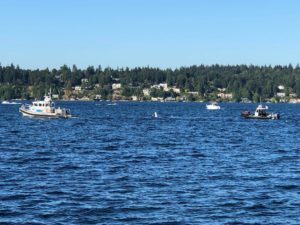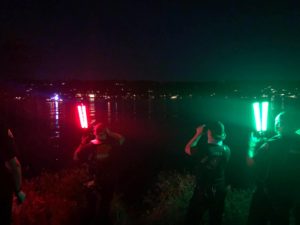
Sunday, August 9: Sadly, we had two water responses that evening that did not have a good outcome. Just after 5:30 p.m., we received reports of an adult male who was swimming and went under near the 5000 block of Lake Washington Blvd. S. Divers, rescue swimmers and response boats conducted a search about 400 feet from shore. Unfortunately the person was not found by our crews and the scene was turned over to the Seattle Police Department.

The second incident happened at 8:40 p.m. when we received reports of an adult female in her 20’s that went missing in the water near Seward Park. Our crews coordinated with Seattle Police to deploy divers, rescue swimmers and response boats to search the water. Crews searched for over an hour, but we were unable to locate her. Both incidents were turned over to the Seattle Police Department and their latest update was posted here.
Yesterday was an unfortunate reminder that drownings can happen when you least expect it. We encourage you to practice boating safety and to be aware whenever you are near or in water.
Here are a few boating safety tips:
- Wear a life jacket — Always wear a U.S. Coast Guard approved life jacket when boating, tubing, rafting, swimming or other activities in or on lakes, rivers, salt water, or pools without a lifeguard. Life jacket information for children and teens.
- Know the risks — Washington waters are often cold enough to cause muscles to not work, even on the hottest summer day. Cold water can weaken even the strongest swimmer.
- Supervise children in or near water — Always provide close and constant attention to children you are supervising in or near water. Stay within touching distance of young children at all times.
- Learn to swim, including water safety and survival skills — To enjoy the water safely, learn swim strokes, water safety, survival skills, and becoming comfortable in the water.
- Do not use alcohol or drugs during water activities — Never use alcohol or other impairing drugs during water and boating activities or while supervising children around the water. Alcohol affects balance, coordination, and judgement. Exposure to sun and heat worsen these effects.
- Learn first aid and CPR — Learn first aid and CPR. Seconds count—the more quickly lifesaving CPR is started, the better the chances of recovery. Dial 911 in an emergency.
It is important for boaters to be familiar with the Regulations of Recreational Vessel operation. More information is available online at www.parks.wa.gov/boating. Boater education can increase safety on the waterways.